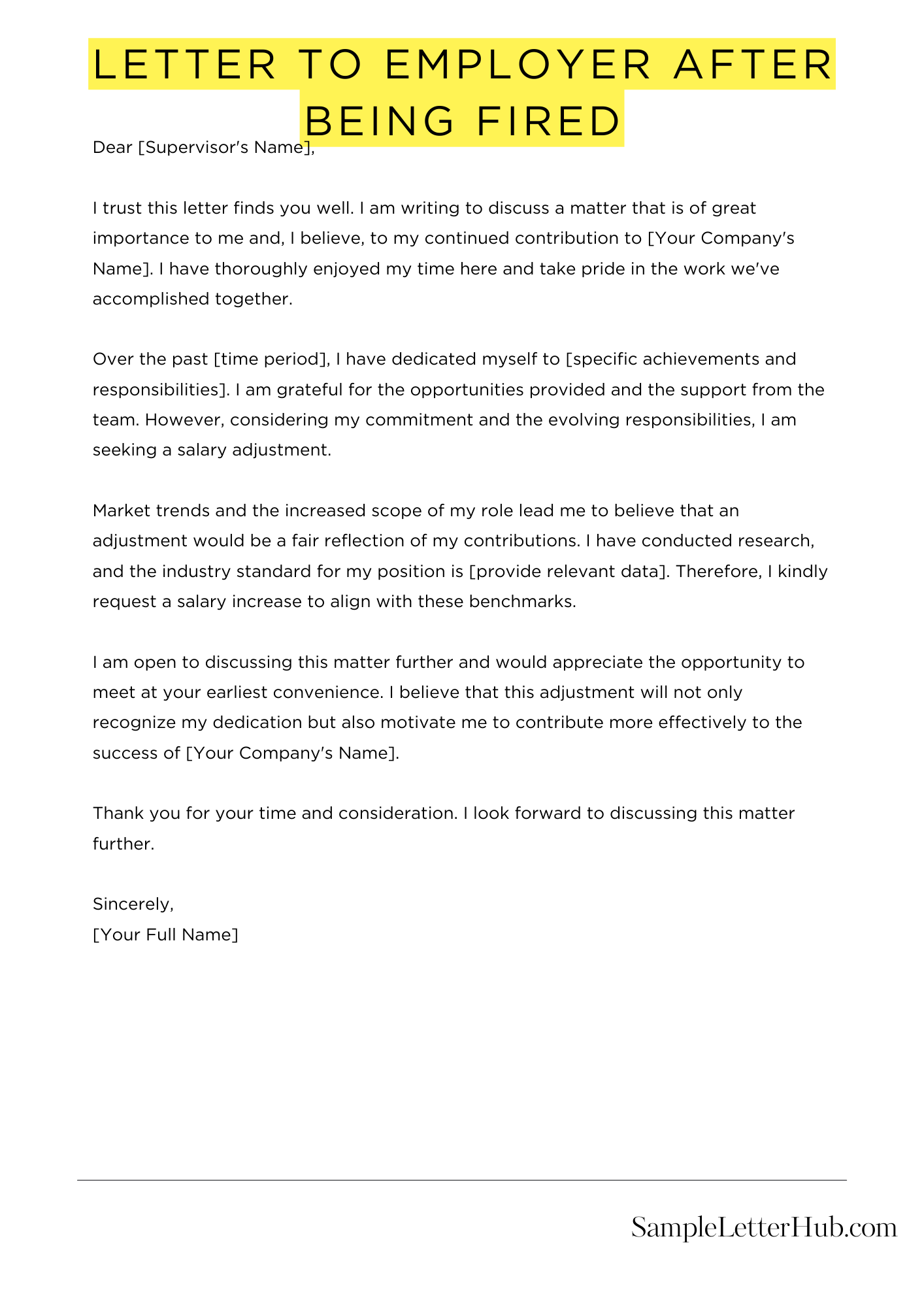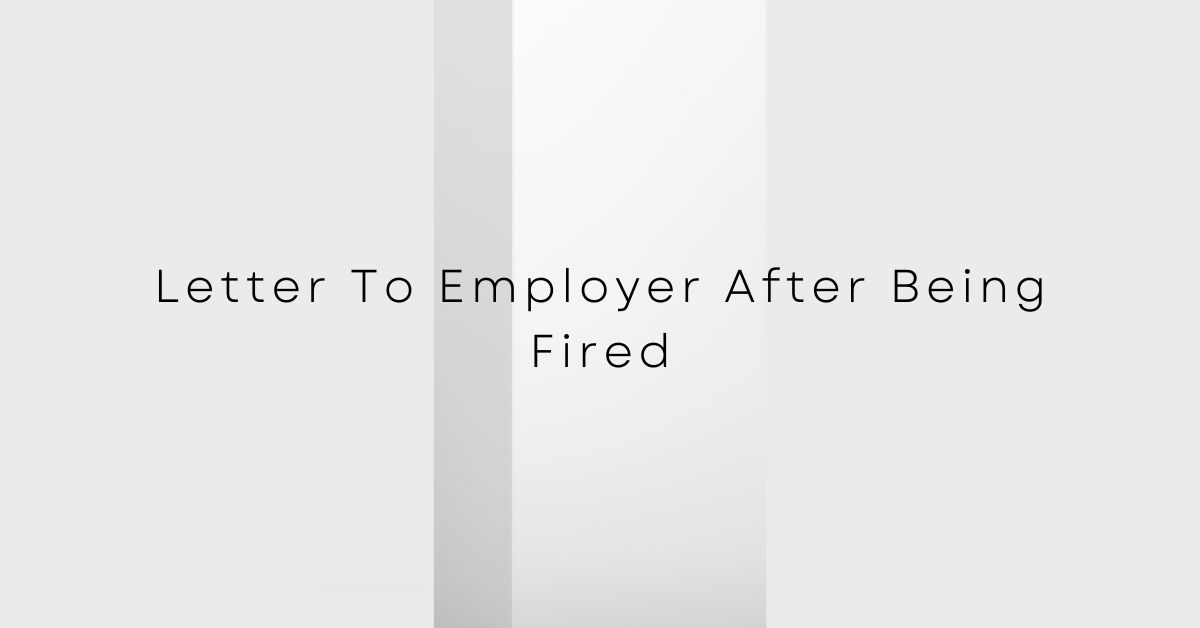A Letter To Employer After Being Fired is a formal letter written to your employer after you have been terminated from your job. The purpose of this letter is to document the termination, express your understanding of the reasons for your dismissal, and maintain a professional relationship with your former employer.
In this article, we will provide you with templates, examples, and samples of Letter To Employer After Being Fired. These samples will help you craft a well-written letter that effectively communicates your message and leaves a positive impression on your former employer.
Letter to Employer After Being Fired
Dear Mr./Ms. [Employer’s Name],
I am writing to express my disappointment and regret regarding my recent termination from my position as [Your Position] at [Company Name]. I was informed of my termination on [Date of Termination] by [Person Who Informed You].
During my time at [Company Name], I consistently exceeded expectations in my role. I was responsible for [List of Responsibilities]. I also played a key role in [List of Projects or Accomplishments].
I am confident that I have the skills and experience necessary to continue contributing to the success of your company. I am eager to discuss the possibility of being reinstated to my previous position or any other suitable role within the organization.
I understand that my termination may have been due to [Reason for Termination]. I take full responsibility for my actions and am committed to learning from this experience. I have already taken steps to address the issues that led to my termination and am confident that I can be a valuable asset to your team once again.
I would appreciate the opportunity to meet with you to discuss my reinstatement and demonstrate my commitment to the company. I am available to meet at your earliest convenience.
Thank you for your time and consideration.
Sincerely,
[Your Signature]

How to Write a Letter to an Employer After Being Fired
Being fired is never easy, but it’s important to remember that you’re not alone. Millions of people are fired every year, and many of them go on to find new jobs that are even better than their old ones.
If you’ve been fired, the first thing you need to do is take some time to process your emotions. It’s natural to feel angry, hurt, and confused. Allow yourself to grieve the loss of your job, but don’t let your emotions get the best of you.
Once you’ve had some time to process your emotions, it’s time to start thinking about your next move. One of the best things you can do is to write a letter to your former employer.
There are several reasons why you might want to write a letter to your former employer after being fired.
Apologize for any mistakes you made.
If you were fired for performance reasons, you may want to apologize for any mistakes you made. This will show your former employer that you’re taking responsibility for your actions and that you’re committed to learning from your mistakes.
Express your gratitude for the opportunity to work at the company.
Even if you were fired, it’s important to remember that you learned a lot during your time at the company. Express your gratitude for the opportunity to work there and for the experience you gained.
Request a letter of recommendation.
If you’re looking for a new job, you may want to ask your former employer for a letter of recommendation. This will show potential employers that you’re a hard worker and that you’re capable of doing the job.
When writing a letter to your former employer after being fired, it’s important to be professional and respectful. Avoid being negative or accusatory. Instead, focus on the positive aspects of your experience at the company and on your plans for the future.
Here are some tips for writing a letter to your former employer after being fired:
Keep it brief.
Your letter should be no more than one page long. Get to the point and avoid rambling.
Be professional.
Use formal language and avoid using slang or colloquialisms.
Be respectful.
Even if you were fired for performance reasons, it’s important to be respectful of your former employer. Avoid being negative or accusatory.
Be positive.
Focus on the positive aspects of your experience at the company and on your plans for the future.
Proofread your letter carefully.
Make sure your letter is free of errors in grammar and spelling.
Once you’ve written your letter, mail it to your former employer. Be sure to include a stamped, self-addressed envelope so that your former employer can respond to you.
FAQs about Letter To Employer After Being Fired
1. What should I include in a letter to my employer after being fired?
In your letter, you should include your name, address, date, the name of the company, the company’s address, a salutation, an introduction, a body paragraph explaining your understanding of the termination, a body paragraph expressing your gratitude, a closing paragraph, and your signature.
2. How should I format my letter?
Your letter should be formatted in a professional business letter format. Use a standard font, such as Times New Roman or Arial, and 12-point font size. Left-align your text and use single line spacing. Include your contact information in the header and the date in the header or the first paragraph.
3. What tone should I use in my letter?
The tone of your letter should be professional and respectful, even if you are angry or upset about being fired. Avoid using negative or accusatory language. Instead, focus on the positive aspects of your experience with the company and express your gratitude for the opportunity to work there.
4. Should I request a reference letter?
Yes, you should request a reference letter from your former employer if you believe they would be able to provide a positive reference. In your letter, you can state that you would be grateful if they would be willing to provide a reference letter for you.
5. Should I send my letter by email or mail?
You can send your letter by email or mail, depending on your preference. If you send your letter by email, be sure to use a professional email address and subject line. If you send your letter by mail, be sure to use a professional envelope and stamp.

